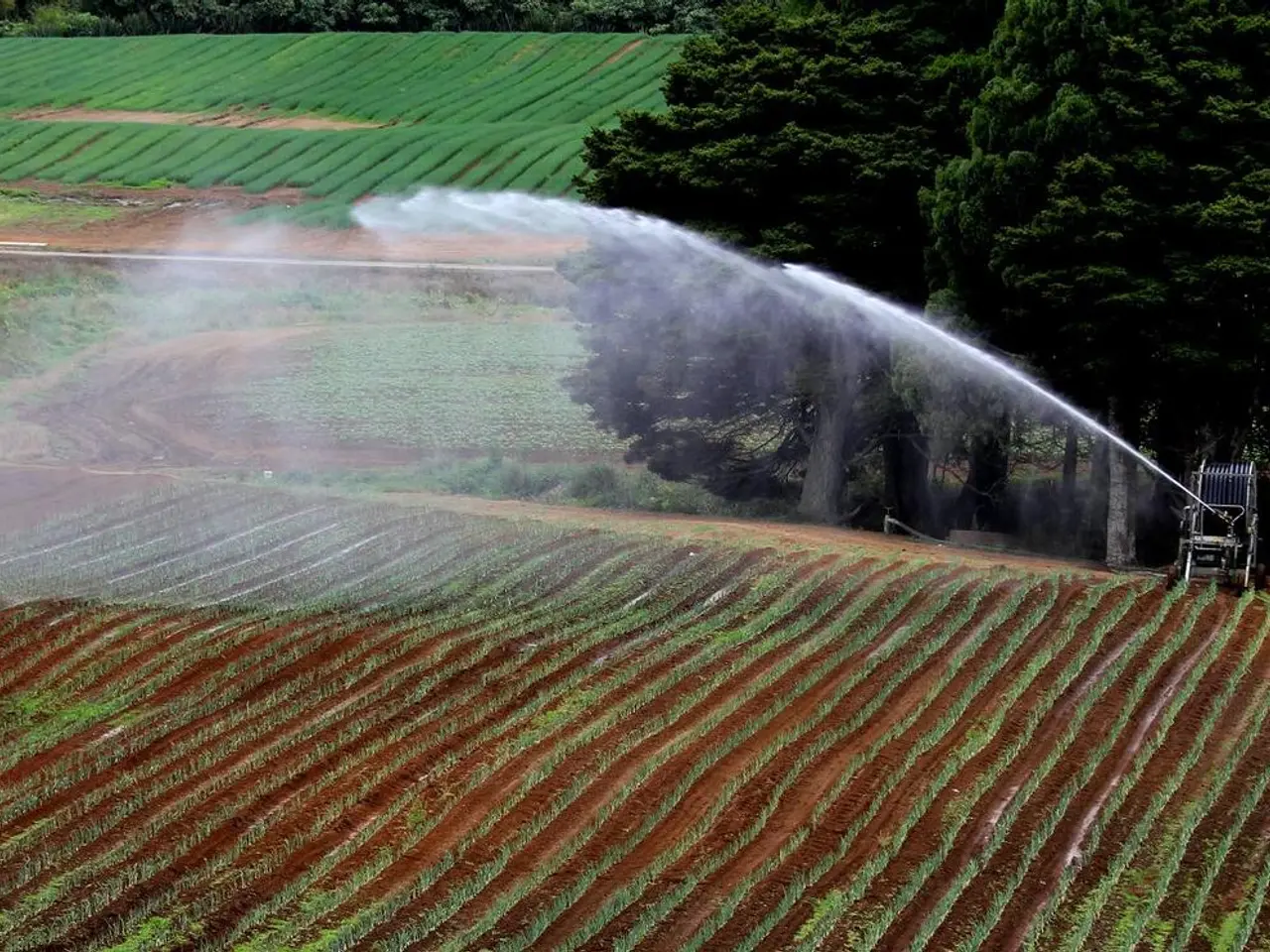Strategies for Controlling Excess Groundwater Levels
In the heart of the agricultural sector, a new wave of innovation is transforming the way water is used and managed. From precision irrigation to smart technologies, the focus is on using water wisely and protecting our precious water resources.
One of the key strategies is the adoption of precision irrigation methods, such as drip and sub-surface irrigation. These techniques deliver water directly to plant roots, minimising loss and helping maintain optimal soil moisture. Sub-surface irrigation systems, in particular, are proving effective in managing capillary movement of water into the root zone, ensuring a stable water table.
Rainwater harvesting and storage are another essential component of sustainable water management. By capturing runoff during rainy periods, these methods recharge groundwater and provide irrigation during dry spells.
Mulching and conservation tillage also play a crucial role in water management. By improving soil moisture retention and reducing evaporation, these techniques indirectly support water table stability.
Innovations in irrigation technology, like smart irrigation systems and drones, are revolutionising the way we manage water. Smart irrigation technologies use sensors and AI for real-time soil moisture monitoring, preventing over-irrigation and waterlogging. Crop diversification and the selection of drought-resistant crops are other strategies that optimise water use.
Structural measures, such as ponds, check dams, and tile drainage systems, regulate surface and groundwater movement and maintain desired water table depths for crop needs. These integrated approaches ensure efficient water use, support soil health, and help maintain sustainable water tables in agricultural landscapes.
Financial aid and incentives are available to help farmers switch to these more efficient water use practices. Workshops and training programs offer hands-on learning for farmers to adopt efficient irrigation and conservation practices. Compliance with environmental standards is crucial for keeping water safe and clean.
The U.S. government has regulations to help farmers use water wisely and protect water resources. Irrigation policies focus on using water well, setting standards for water quality and use. The Pre-harvest Agricultural Water Provisions (Produce Safety Rule) has different compliance dates for large, small, and very small farms.
Engaging the local community is essential for the widespread adoption of water-saving practices in agriculture. By collaborating with local farmers, sharing best practices, and holding workshops, we can create a more sustainable future for water resources.
Sustainable water management is crucial for the future. It involves using new technologies, making water use more efficient, and integrating these practices into future planning. This will build resilient farms for long-term water security.
Keeping groundwater resources healthy is key to ensuring water security for the future. Reusing wastewater is important for sustainable water management, and new materials and processes, like graphene and algae, will make our water economy more sustainable.
The impact of climate change on water management is a significant threat, causing more droughts and floods. Adaptable management will be required to tackle these issues. Cost-benefit analysis of efficient practices is vital when choosing modern irrigation systems. Decentralized systems, like on-site treatment, can also help make our water economy more sustainable.
In Western States, irrigation accounts for 90% of freshwater consumption, and nationwide it is 80%. Signs of over-irrigation include waterlogged soil, poor plant growth, and yellow leaves. Strategies to mitigate over-irrigation include crop rotation, cover crops, and appropriate soil amendments.
16% of harvested cropland generates 49% of total crop sales, highlighting the importance of efficient water use in agriculture. Using the right soil amendments and sustainable farming practices can help save water and improve soil health.
The future of water management will require adaptable management to tackle issues like population growth and climate change. The U.S. government, through its regulations and guidelines, plays a role in promoting sustainable water use in farming. Technology like soil moisture sensors and irrigation software can help manage water more efficiently.
In conclusion, the future of agriculture lies in sustainable water management. By adopting precision irrigation, smart technologies, and other green tech, we can save money, protect water resources, and build resilient farms for the future. Sharing success stories and collaborating with local farmers will drive progress towards better water use and a more sustainable future.
[1] Water Management in Agriculture: A Comprehensive Guide [2] Smart Irrigation for Sustainable Agriculture [3] Water-Saving Techniques for Agriculture [4] Water Management in Agriculture: Challenges and Opportunities [5] Sustainable Water Management in Agriculture: A Review
- Embracing precision irrigation techniques, such as drip and sub-surface irrigation, is a key strategy in agriculture for targeting water directly to plant roots, minimizing loss, and maintaining soil health.
- Financial aid and incentives are available to farmers who switch to efficient water use practices, including learning opportunities through workshops and training programs.
- To address climate change threats, like increased droughts and floods, adaptive water management will be essential, alongside cost-benefit analysis of efficient practices when modernizing irrigation systems.
- In the realm of fitness-and-exercise and health-and-wellness, the importance of proper nutrition cannot be overstated, as a balanced diet contributes to overall sustainability.
- Structural measures, such as ponds, check dams, and tile drainage systems, help regulate water movement and maintain desired water table depths for crops, thereby ensuring efficient water use and supporting soil health.
- The environmental science behind smart irrigation technologies, like soil moisture sensors and AI, are revolutionizing farming, promoting sustainability through real-time monitoring that prevents over-irrigation and waterlogging.




